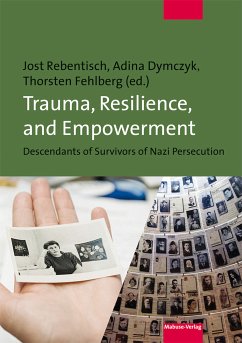Traumas can be passed from one generation to the next - this is well known - and hardly any group is so affected by this phenomenon as the descendants of people persecuted by the Nazis. But just how does this transfer take place? What role do family traditions and continued social practices play? Does genetics have an impact? Furthermore, can the cycle be broken? The descendants of those persecuted by the Nazis can draw on unique resources and skills. They make significant contributions to political and social reckonings with the Nazi era and they work for the welfare of the survivors. Many are active in political education and advocate for an appropriate culture of remembrance. In a time of increasing right-wing populism, their views are indispensable. This publication was made possible with support from the German Federal Ministry for Family Affairs, Senior Citizens, Women and Youth.
Dieser Download kann aus rechtlichen Gründen nur mit Rechnungsadresse in A, B, BG, CY, CZ, D, DK, EW, E, FIN, F, GR, H, IRL, I, LT, L, LR, M, NL, PL, P, R, S, SLO, SK ausgeliefert werden.









